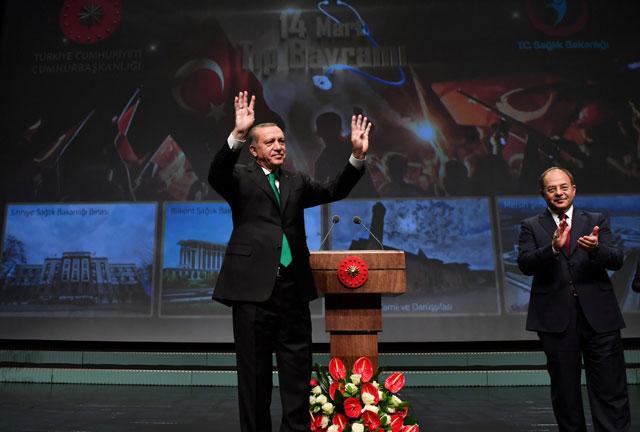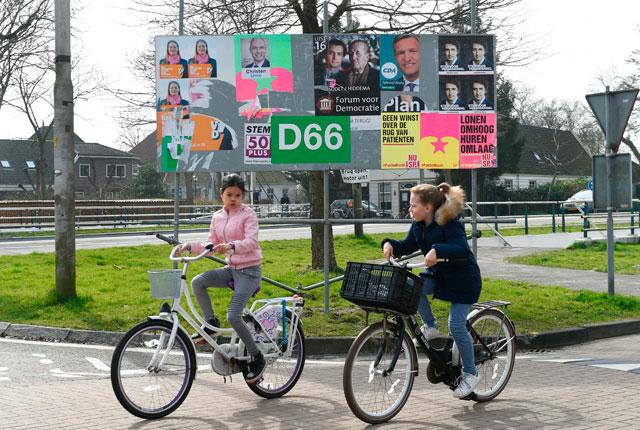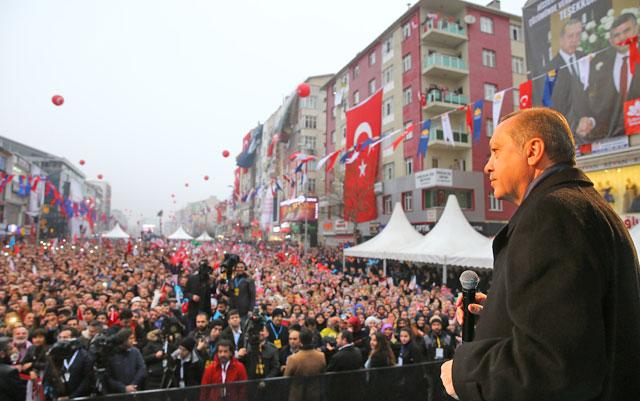You are here
Erdogan riles Dutch with Srebrenica jibe, threatens new retaliation
By AFP - Mar 14,2017 - Last updated at Mar 14,2017

Turkish President Recep Tayyip Erdogan, accompanied by Health Minister Recep Akdag, greets the audience during a meeting in Ankara, Turkey, on Tuesday (Reuters photo)
ANKARA — Turkish President Recep Tayyip Erdogan on Tuesday prompted a fresh outcry in the Netherlands with a jibe about the 1995 Srebrenica massacre, warning of new retaliation in a spiralling diplomatic crisis.
Keeping an uncompromising tone, Erdogan said a ‘yes’ vote in an April 16 referendum on expanding his powers would be the best response to Turkey’s “enemies” in a tumultuous dispute that risks wrecking the entire Ankara-Brussels relationship.
He said the Dutch character was “broken” after Netherlands peacekeepers failed to prevent the 1995 Srebrenica massacre of Bosnian Muslims in the break-up of the former Yugoslavia, comments described as “repugnant” by The Hague.
Ankara had a day earlier announced it was suspending high-level relations with the Hague after the Netherlands prevented two Turkish ministers from holding rallies to woo expatriate support ahead of the referendum.
The Dutch ambassador to Ankara — currently outside the country — has also been blocked from returning to his post.
Erdogan also late Monday sparked a new row with Berlin by lashing out at German Chancellor Angela Merkel for “supporting terrorists”.
‘We know them from Srebrenica’
EU Foreign Policy Chief Federica Mogherini and EU Enlargement Commissioner Johannes Hahn urged Erdogan to show moderation, calling on Turkey to “refrain from excessive statements and actions that risk further exacerbating the situation”.
But far from stepping back, Erdogan accused the Netherlands of “state terror” in preventing Turkish ministers from holding pro-’yes’ rallies and said more sanctions were planned.
“We are going to work more” on measures against the Netherlands, said Erdogan. “These wrongs won’t be solved with a sorry, we have more things to do.”
Erdogan had previously angered the Netherlands by saying the authorities had behaved like the Nazis, who had occupied and bombed the country in the World War II.
But on Tuesday he touched an arguably even rawer nerve, recalling the 1995 Srebrenica massacre in Bosnia, which Dutch UN peacekeepers failed to prevent in an episode that remains a national trauma to this day.
“The Netherlands and the Dutch, we know them from the Srebrenica massacre,” he said.
“We know how much their morality, their character is broken from the 8,000 Bosnians that were massacred,” Erdogan said.
“We know this well. No one should give us a lesson in civilisation. Their history is dark but ours is clean.”
Dutch Prime Minister Mark Rutte called his claim a “repugnant historical falsehood” and said “Erdogan’s tone is getting more and more hysterical”.
“We won’t sink to that level”, he said.
‘The best answer’
Erdogan’s latest broadside against Merkel also infuriated Germany, which had also last week prevented Turkish ministers from holding rallies in the country.
Merkel’s spokesman described the accusations as “absurd”, saying the chancellor had no intention of taking part in a “competition of provocations”.
Germany’s Interior Minister Thomas de Maiziere on Tuesday said Ankara was playing the role of the victim with its broadsides against NATO allies, as Erdogan seeks to “build solidarity” ahead of the referendum.
In response to the controversy, German state Saarland said Tuesday it would ban all foreign officials from holding election rallies on its soil.
Responding to the EU’s criticism, the Turkish foreign ministry spat back that: “The EU’s short-sighted statement has no value for our country.”
The move by the Netherlands to block the rallies by Turkish ministers comes as Rutte prepares to face the far-right populist Geert Wilders in a general election on Wednesday.
Analysts say that with polls indicating a tight outcome in the April 16 referendum in Turkey, Erdogan is keen to exploit the crisis to win the support of nationalist voters in Turkey who are crucial in determining the outcome of polls.
“Our nation on April 16 at the ballot box... will give the best answer to Turkey’s enemies,” Erdogan said.
In a bid to woo support from citizens living in Europe — where a majority have traditionally supported the ruling party — Turkish officials have sought to take the campaign to European cities.
In Germany, there are over 1.4 million Turkish citizens eligible to vote while there are nearly 250,000 in the Netherlands, according to official figures from November 2015.
Related Articles
ISTANBUL — The European Union on Monday warned President Recep Tayyip Erdogan to avoid inflammatory rhetoric, as a diplomatic crisis between
ISTANBUL — Turkish President Recep Tayyip Erdogan on Sunday warned the Netherlands would pay a price for preventing his ministers from holdi
ISTANBUL — Turkish President Recep Tayyip Erdogan on Saturday said a Dutch ban on his foreign minister's visit was like Nazism, as tensions


















